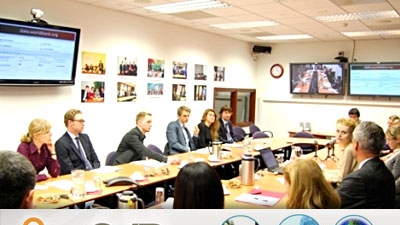“For all of us in the World Bank the Open Data Initiative is a transformation," said Xavier Devictor, Country Manager for Poland and the Baltic Countries during the March presentation. "It's a new transparent and open approach to development issues. I am really glad to see how the demand for our data is growing, also in Poland and especially among researchers and academics.”
The initiative, launched in April 2010, has a simple goal, but one that aims to solve the World’s complicated development problems: to provide access to free, “open data,” tools and information on the global economy and the Bank’s operations to allow researchers, students and local communities to use the data to measure results, increase knowledge and work together to find solutions to development problems.
It includes a range of reforms enabling free access to more than 7,000 development indicators, as well as a wealth of information on World Bank projects and finances. The initiative’s Web site provides users with improved access to World Bank data and makes that data easy to find and use.
The Bank’s Access to Information Policy, launched in July 2010, went a step further in breaking new ground to give the public access to their information.
“Knowledge is power,” said World Bank Group President Robert B. Zoellick. “Making our knowledge widely and readily available will empower others to come up with solutions to the world’s toughest problems. Our new Open Access policy is the natural evolution for a World Bank that is opening up more and more."
The World Bank recognizes that transparency and accountability are essential to the development process and central to achieving the Bank’s mission to alleviate poverty. The Bank’s commitment to openness is also driven by a desire to foster public ownership, partnership and participation in development from a wide range of stakeholders. As a knowledge institution, the World Bank’s first step is to share its knowledge freely and openly—statistics and data being a key component.
Broader access to the data allows policymakers and advocacy groups to make better-informed decisions and measure improvements more accurately. They are also valuable tools to support research by journalists, academia and others, broadening understanding of global issues.
Effective July 1, 2012, the World Bank will implement a new Open Access policy for its research outputs and knowledge products. The new policy builds on Bank efforts to increase access to information and make its research as widely available as possible.
The policy, which will be rolled out in phases in the coming year, formalizes the Bank’s practice of making research and knowledge freely available online. Now anybody is free to use, re-use and redistribute most of the Bank's knowledge products and research outputs for commercial or non-commercial purposes.
“This new policy is a natural extension of our other efforts to make the Bank more open, including the Open Data Initiative and the landmark Access to Information Policy”, said Caroline Anstey, World Bank Managing Director. “Anyone with Internet access will have much greater access to the World Bank’s knowledge. And for those without internet access, there is now unlimited potential for intermediaries to reuse and repurpose our content for new languages, platforms and media, further democratizing development by getting information into the hands of all those who may benefit from it.”
It is one thing providing access to the Bank’s wealth of data and information, but quite another to come up with creative ways to use it. The “Apps for Climate Competition” that ran from December 2011 to mid-March 2012, brought together the best ideas from scientists, application developers, civil society organizations, and development practitioners to create innovative apps using Bank data. The 14 finalists and those receiving honorable mention are from around the globe including Bolivia, France, Macedonia, Norway, the United States and the UK.
With their apps you can track your own personal carbon footprint or play the climate change trivia game “Climatico” on Facebook. App developers even came up with ingenious ways for children to benefit from the data. The 8 to 14-year-old crowd can take a virtual global field trip to experience climate change challenges themselves or with the Climate for Children app teachers use the open data to raise children’s awareness from an early age about the problems defined as Millennium Development Goals.
With Open Data, the possibilities are endless.


